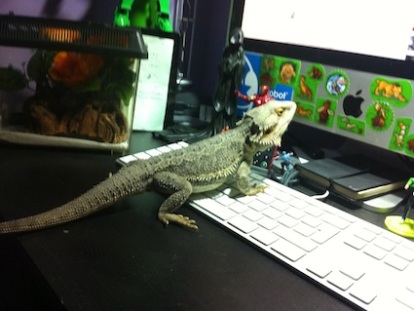I am a terrible person. According to the RSPCA, as the keeper of two ‘exotic’ pets (a crested gecko and a bearded dragon), I contribute to the number of people keeping ‘wild animals…in captivity,’ which serves to magnify the suffering of these creatures.
It is fine, however, for me to keep my rabbit as a pet, as he is an example of a species that has undergone years of domestication, which apparently serves to make him a suitable companion, much like dogs, cats, the domestic pigeon (!) and the domesticated Bactrian camel (!!!).
The final pledge of the five that have been put into practice by the RSPCA to ‘help animals to improve their welfare’ states: ‘We pledge to reduce the number of exotic animals kept as pets and increase their humane care.’ The latter part of this I really take no issue with. I am, however, baffled as to why the RSPCA seem to believe that simply because an animal is ‘domesticated’, it must make for a healthier, happier pet than one who is not.
To ‘domesticate’ an animal is ‘to tame (an animal), especially by generations of breeding, to live in close association with human beings as a pet or work animal and usually creating a dependency so that the animal loses its ability to live in the wild.’ Some charming eventualities of this have included:
• Boxer dogs commonly suffering from epilepsy as a result of inbreeding to retain their pedigree.
• Dyspnea in Pugs and Bulldogs.
• High occurrences of cancer in Rottweilers.
• Polycystic kidney disease in Maine Coon and Persian cats.
• Glycogen branching enzyme deficiency in horses.
It, therefore, shocks me that the RSPCA intend to stop the general public from breeding animals such as lizards, where the majority of common health problems can be avoided with good husbandry, but not pedigree dogs. Whilst I am not intending to criticise dog breeders, it is difficult to understand the RSPCA’s endorsement of keeping animals whose breeding alone almost assures a shorter lifespan, compared to undomesticated animals who generally do not suffer from these issues.
The RSPCA claim that the husbandry of exotic animals is often inadequate. They claim that up to 15% of captive reptiles suffer from malnutrition. Whilst I don’t dispute this fact, as there are incompetent reptile keepers out there, it is difficult to take husbandry advice from an association that solicits the use of heat mats in bearded dragon vivariums. This is nonsensical due to the fact that bearded dragons are almost completely unable to sense and absorb heat through their stomachs, meaning that they can be burnt by the mat whilst getting not benefitting from the heat. I also believe I have the support of many reptile keepers when I say that the specific needs of reptiles often make us more researched and passionate about our animals.
I’m sure there are many imbeciles out there who buy iguanas off the cuff and give them away when it emerges they are not cute and cuddly, but the scale on which this happens is surely insignificant compared to more common pets, such as dogs or cats. At my local rehoming centre, there were 117 Staffordshire Bull Terriers versus absolutely no reptiles. Again, I am not criticising staffie owners, I am merely pointing out which way the scales seem to tip.
Yes, my bearded dragon and crested gecko are not domesticated, but that’s because they don’t need domesticating. My beardie is as docile as pets come, except at feeding times! I do agree, however, with the RSPCA’s proposal of requiring a license to own all exotic animals (some species already need one), I just think this should be extended to dogs as well. I would also like the finger to be pointed in all directions, not just at us irresponsible, abhorrent reptile keepers.
Farewell, monthly donations…



